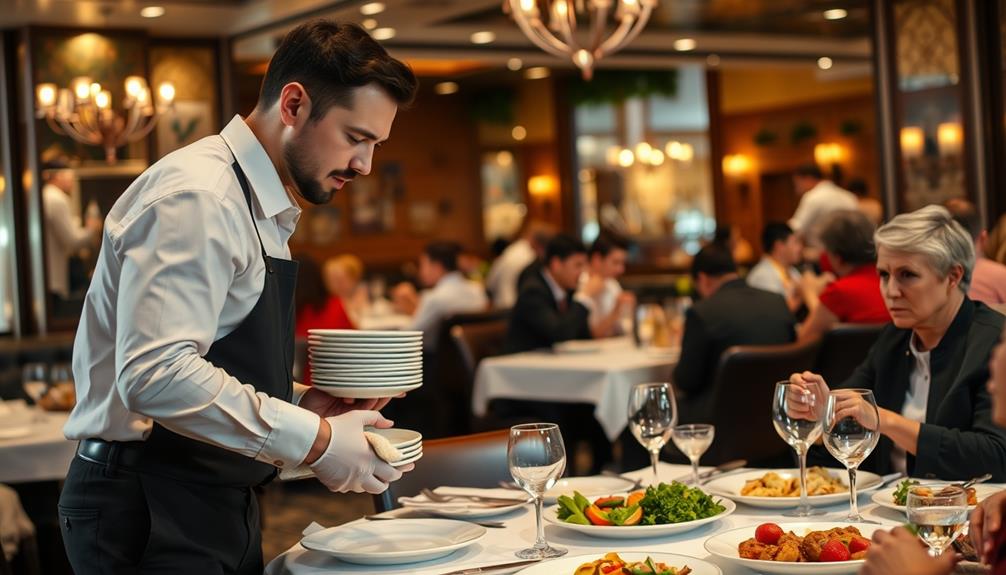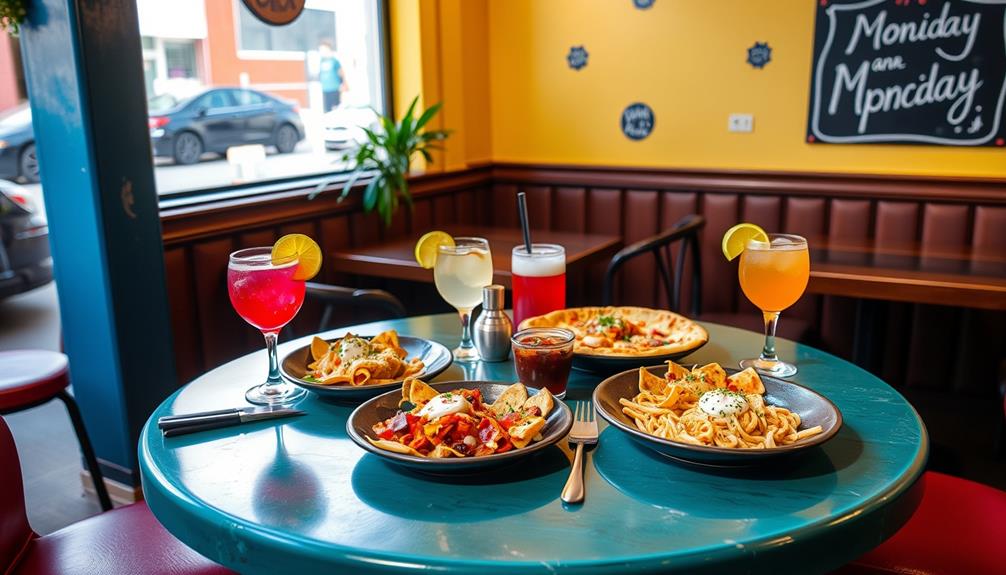As a busser in a restaurant, you play an essential role in keeping the dining area clean and organized. You clear dirty plates, glasses, and utensils promptly, ensuring tables are ready for new guests. Wiping down surfaces and resetting tables with fresh utensils and condiments is also your responsibility. You assist the waitstaff by delivering food and drinks and checking on guest needs. This fast-paced environment requires teamwork, strong communication, and attention to detail. Your efforts contribute greatly to customer satisfaction and smoother operations. Discover how you can thrive in this role and the opportunities it brings.
Key Takeaways
- Bussers clear dirty plates, glasses, and utensils from tables promptly after guests finish their meals to maintain cleanliness.
- They wipe down and sanitize tables to uphold hygiene standards for new customers.
- Bussers reset tables with clean utensils, napkins, and condiments, preparing for incoming guests.
- They assist servers by delivering food and drinks and monitoring guests' needs for enhanced service.
- Bussers work in a fast-paced environment, requiring physical stamina and teamwork with waitstaff and kitchen crew.
Overview of a Busser's Role
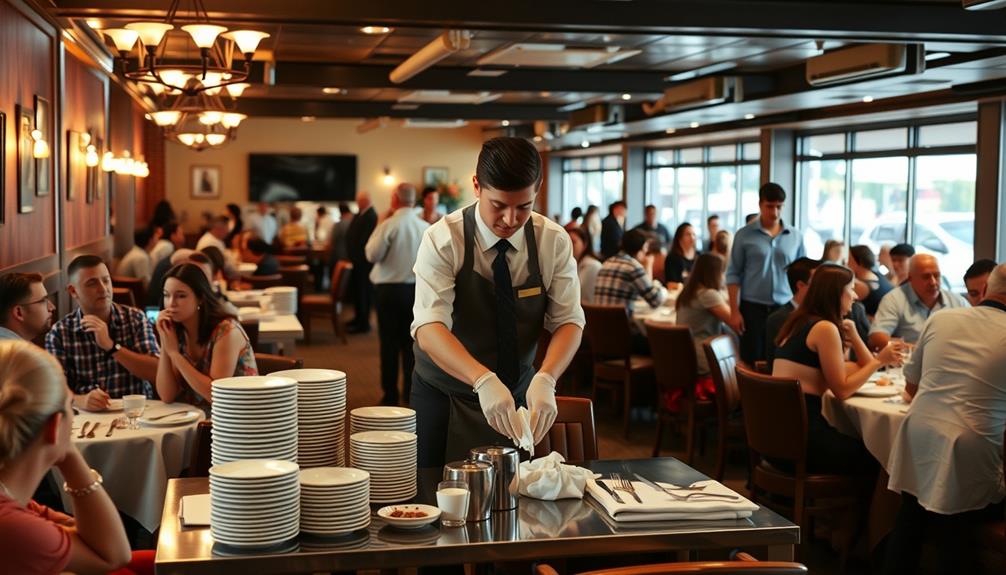
In a bustling restaurant, a busser plays an essential role in guaranteeing everything runs smoothly. You'll find yourself in a fast-paced environment, where maintaining cleanliness is critical. Your primary responsibility involves cleaning up dirty plates, glasses, and silverware from tables, which keeps the dining area tidy and inviting. Additionally, guaranteeing a hygienic space contributes to the importance of sanitation and safety policies.
As a busser, you also prepare tables for new guests by setting them up with utensils and condiments, creating a welcoming atmosphere. You work closely with the waitstaff, refilling beverages and alerting servers when customers need assistance. This teamwork enhances the overall customer service experience, making diners feel valued and attended to.
Moreover, your efforts contribute considerably to improving table turnover. By efficiently clearing and resetting tables, you help guarantee that more guests can enjoy their meals, ultimately boosting customer satisfaction and the restaurant's success.
You adhere to sanitation and safety policies, cleaning up spills and maintaining a clean environment to protect guests. Your role may not always be in the spotlight, but it's essential for the restaurant's operations and the enjoyment of every diner.
Key Responsibilities of Bussers
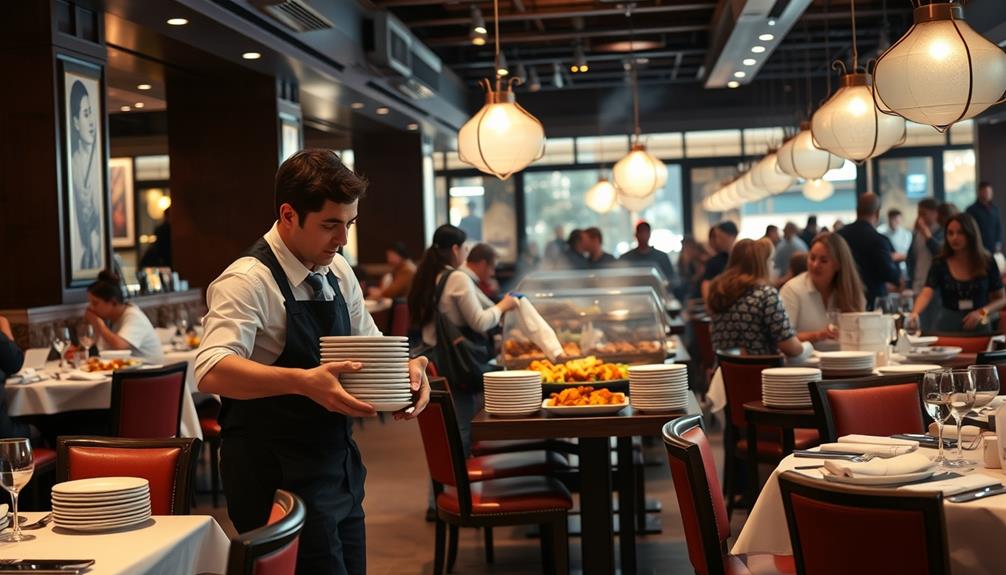
Bussers jump into action to guarantee a seamless dining experience for guests. One of your key responsibilities is clearing tables promptly after guests finish their meals.
You'll efficiently remove used dishes, glassware, and utensils, ensuring the dining area remains organized. Maintaining cleanliness is vital, so you'll wipe down and sanitize tables to create a hygienic environment for patrons. Additionally, just as fuel injection cleaning impacts vehicle performance, maintaining a clean dining area is essential for a positive guest experience.
Once tables are cleared, you're tasked with resetting tables for the next customers. This involves arranging clean utensils, napkins, and condiments, preparing everything for new guests.
Your customer service skills come into play as you assist servers during busy periods. You'll deliver food and drinks, while also keeping an eye out to alert servers when guests need refills or additional assistance.
Work Environment and Conditions
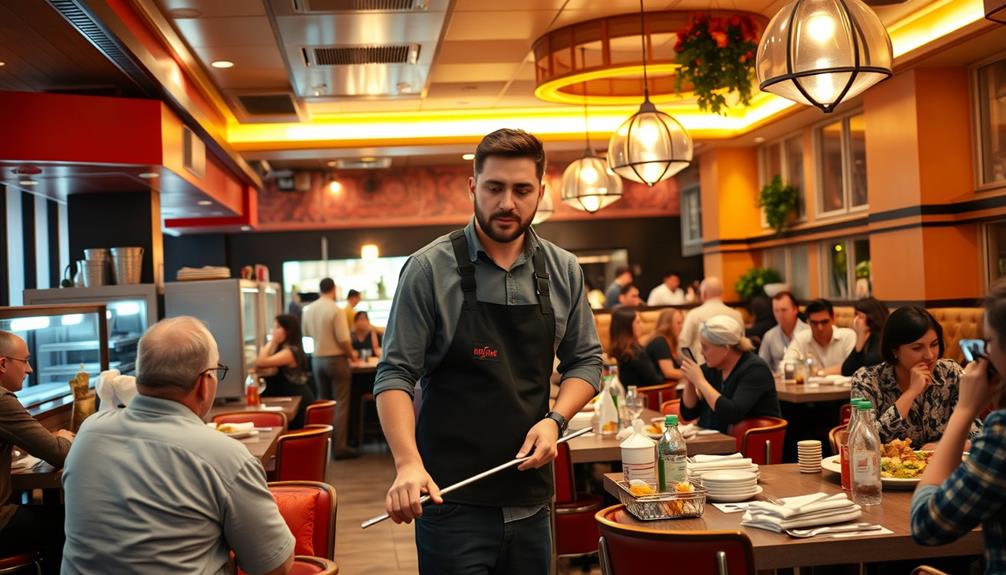
The bustling atmosphere of a restaurant creates a unique work environment for bussers, who thrive in fast-paced settings. You'll find yourself standing for long periods, walking throughout dining areas, and lifting heavy items like trays and tables. This demands not just physical stamina but also strength to keep up with the rigorous demands of the job.
Additionally, the ability to work quickly and efficiently is vital, much like mastering the art of bug out bags, where organization and readiness are key.
As a busser, you often collaborate closely with various restaurant staff, including waitstaff and kitchen crew. This teamwork is essential in maintaining efficiency and ensuring customer satisfaction.
You'll be exposed to cleaning chemicals and equipment, which are necessary for upholding sanitation standards. It's vital to handle these materials safely and responsibly.
Expect irregular working hours, as many restaurants operate primarily during evenings and weekends. This can lead to rotating schedules that may not always align with a traditional workweek.
However, the dynamic environment and the hustle of a busy restaurant can be incredibly rewarding for those who enjoy a lively workplace. Embrace the challenges, and you'll likely find a sense of fulfillment in contributing to the overall dining experience.
Average Salary and Compensation

When you consider the average salary for a busser, it typically hovers around $10.61 per hour, but it can vary based on location and the type of restaurant.
Understanding the importance of budgeting can help bussers manage their earnings effectively. Tips often play a significant role in boosting your earnings, especially in busy settings.
Factors like experience and customer volume also impact your overall compensation, making this a dynamic position financially.
Salary Range Overview
While working as a busser in a restaurant can be a rewarding experience, understanding the salary range is vital for anyone considering this role. The average salary for a busser in the U.S. is about $10.61 per hour, with typical earnings ranging from $7.25 to $19.35 per hour. This wide range largely depends on location and restaurant type. In urban areas or high-end establishments, you're likely to find higher wages.
Additionally, understanding the financial aspects of various job roles, including how they can impact your future planning, is important for anyone entering the workforce, especially in service industries like restaurants. For example, many people may seek financial aid resources to help manage living expenses while pursuing their careers (financial considerations for elderly care).
The national average annual salary sits around $34,117, but this varies greatly based on your experience and the specific restaurant environment. Entry-level bussers may start on the lower end of the scale, but as you gain experience, your earning potential can increase.
Promotions within the restaurant industry can also lead to better pay and more responsibilities.
Tips and Additional Income
Bussers often find that tips can considerably enhance their income, especially in bustling restaurants where excellent service is a priority. The average salary for a busser in the U.S. is around $10.61 per hour, but this varies between $7.25 and $19.35 based on location and restaurant type.
In busy or upscale establishments, tips can considerably supplement your base salary, especially if you excel in customer service. Additionally, roles that prioritize human interaction, like those in the restaurant industry, are generally less affected by automation and AI advancements, ensuring job security for individuals in this field careers in healthcare.
Many restaurants also offer benefits like free or discounted meals, which further boosts overall compensation. Additionally, there's a strong potential for increased earnings through tip-sharing with servers, particularly during peak dining hours when the pace is fast, and guests are generous.
Your experience level and performance can also impact your pay rate and opportunities for advancement in the restaurant industry. As you gain experience, you might find yourself moving up to roles that offer higher pay and more responsibilities, leading to even greater income potential.
Factors Affecting Earnings
Tips can greatly boost a busser's income, but several factors also play a role in determining overall earnings. The average salary for a busser in the U.S. is around $10.61 per hour, though this can range from $7.25 to $19.35 depending on your location and the restaurant type.
For instance, larger establishments or fine dining venues often offer higher pay and more lucrative tips, greatly enhancing your overall earnings. Additionally, just as with investment options in precious metal investments, the type of restaurant can impact wage levels and tipping culture.
Your experience level is another essential factor; as you gain skills and familiarity with the busser job description template, you may qualify for higher wages and increased tips. More experienced bussers usually find themselves in a better position to maximize their income.
Additionally, many restaurants provide benefits like free or discounted meals and flexible schedules, which can improve your compensation package without directly impacting your hourly wage.
When considering a busser position, evaluate these factors to understand how they'll affect your potential earnings. Ultimately, while tips are important, the restaurant's environment and your experience level will shape your financial success.
Essential Skills for Bussers
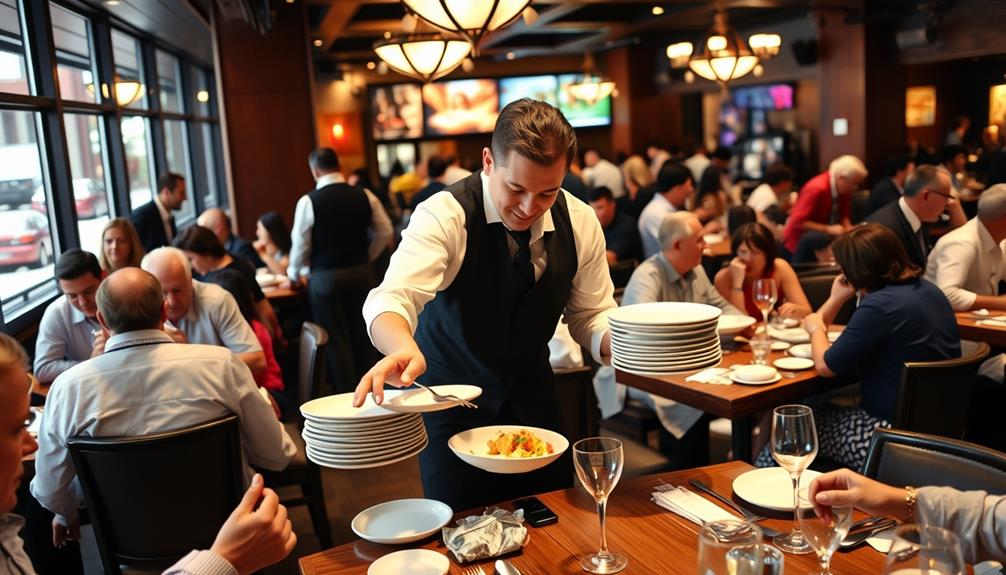
Having a solid set of essential skills can make all the difference for a busser in a restaurant. To excel in this role, you'll need to develop the following key abilities:
- Customer Service Skills: You play a significant role in enhancing the dining experience by maintaining cleanliness and promptly addressing guest needs. Emphasizing the importance of empathy can further elevate your interactions with customers.
- Physical Stamina: Standing for long hours and efficiently moving throughout the restaurant during busy shifts is fundamental. Your endurance helps keep things running smoothly.
- Communication Skills: Effective communication with waitstaff is necessary. You'll need to alert them about customer needs and guarantee seamless restaurant operations.
- Attention to Detail: Paying close attention to how tables are set and guaranteeing the dining area remains clean and organized is critical for maintaining a welcoming atmosphere.
Additionally, strong teamwork is important, as you'll closely collaborate with servers and kitchen staff to support daily operations.
These essential skills not only improve the dining experience for guests but also contribute to a positive work environment for everyone involved. By honing these abilities, you'll set yourself up for success in your busser role.
Educational Requirements and Training

You don't need formal education to become a busser, but a high school diploma or GED can help you stand out.
Most training happens on the job, where you'll learn from managers and experienced staff about safety and cleanliness.
Understanding the importance of maintaining hygiene is vital, especially in environments where food is served, as improper practices can lead to health issues.
Getting a food safety certification can also boost your career in the restaurant industry by showing your commitment to health standards and ensuring a safe dining experience for customers, similar to how essential oils promote health.
No Formal Education Required
Many bussers find that no formal education is necessary to start their careers in the restaurant industry. While some employers may prefer a high school diploma or GED, it's not a strict requirement for this entry-level position.
Most bussers receive extensive on-the-job training that prepares them for their essential role. This training is similar to the preparation needed for maneuvering through complex situations during significant life changes, such as divorce, where understanding the process is critical legal process of divorce.
Here's what you can expect to learn:
- Busser Responsibilities: You'll understand your key tasks, including clearing tables and assisting servers.
- Cleanliness Procedures: Training will cover essential cleanliness procedures to maintain a sanitary environment.
- Customer Service Skills: You'll gain foundational customer service skills to enhance the dining experience.
- Food Safety Certification: Though not mandatory for starting, obtaining food safety certification can boost your career prospects.
This on-the-job training equips you with the skills necessary to excel in a bustling restaurant atmosphere.
Experience gained as a busser can also provide valuable insight into restaurant operations, making you more employable for future roles in the hospitality sector.
On-the-Job Training Provided
Acquiring essential skills through on-the-job training is a cornerstone of becoming a successful busser in a restaurant. You'll typically receive training from managers or experienced staff, focusing on key areas that guarantee smooth restaurant operations.
| Training Focus | Skills Developed | Importance |
|---|---|---|
| Safety Procedures | Understand safety standards | Guarantees a safe working environment |
| Clearing Tables | Efficiently clear and reset tables | Maintains a clean dining area |
| Customer Service | Effective communication | Enhances guest experience |
| Fast-Paced Adaptability | Handle busy shifts | Prepares you for a high-energy environment |
Your training will cover the basics of customer service, helping you communicate effectively with staff and patrons. While no formal educational qualifications are required, obtaining food safety certification can benefit your career advancement. The hands-on experience you gain during on-the-job training is vital, allowing you to quickly adapt to the fast-paced environment typical in restaurants. By mastering these skills, you'll not only improve your efficiency but also contribute positively to the overall dining experience.
Food Safety Certification Benefits
Food safety certification offers significant advantages for bussers in the restaurant industry. By obtaining this certification, you'll gain essential knowledge that helps maintain a clean and safe dining environment for your guests.
Here are some key benefits:
- Proper Sanitation Practices: You'll learn the best methods to keep your workspace clean, reducing the risk of foodborne illnesses.
- Customer Safety: Understanding food safety guarantees that you're contributing to a safe dining experience, which is crucial for customer satisfaction.
- Career Prospects: Many employers prefer candidates with food safety certification, enhancing your chances of advancing to roles like server or kitchen manager.
- Positive Reputation: Bussers who are knowledgeable about health regulations can help create a positive reputation for the establishment, attracting more customers.
In a competitive job market, having a food safety certification makes you a valuable team member. It demonstrates your commitment to maintaining high service standards and guarantees compliance with health regulations.
Career Advancement Opportunities
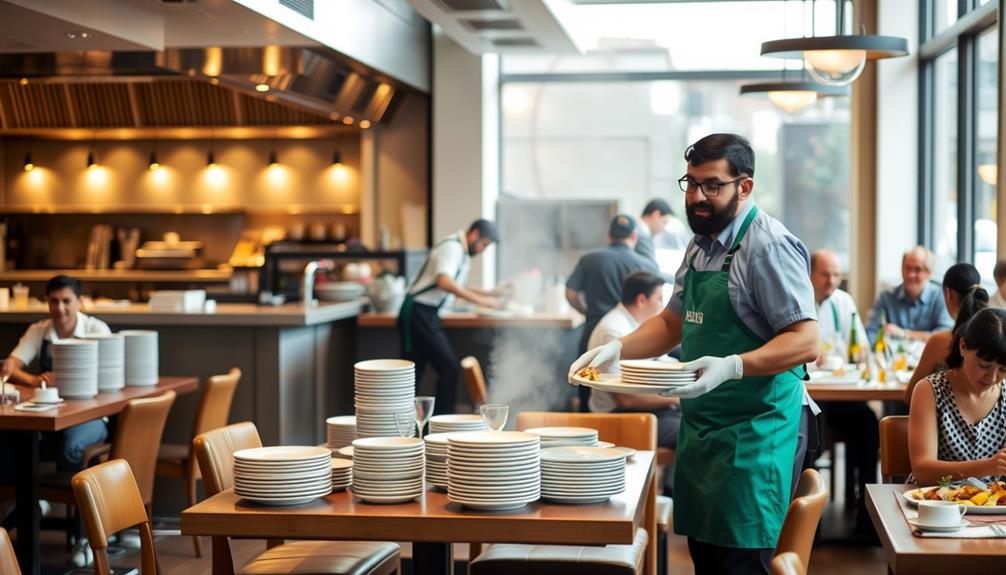
Starting as a busser in a restaurant can be your first step toward a rewarding career in the hospitality industry. While this position is an entry-level role, it offers a solid foundation for career advancement. As a busser, you'll gain valuable experience in customer service and restaurant operations, which are essential for moving up in the industry. Additionally, working as a busser allows you to learn from experienced servers and kitchen staff, providing insight into the various roles within a restaurant. You’ll also have the opportunity to demonstrate your work ethic and willingness to take on additional responsibilities, which can impress management and lead to promotions. However, it’s important to note that as a busser, you may be required to work late shifts, so it’s crucial to plan ahead and avoid driving after one drink.
With dedication and hard work, you can shift to roles such as server or bartender, further enhancing your skill set. Many successful restaurant professionals began their careers as bussers, demonstrating that with performance and commitment, you can climb the ladder.
Eventually, you might find yourself in management roles like restaurant manager or kitchen manager, where you'll oversee staff and daily operations.
Additionally, you can specialize in areas like catering or event management, leading to opportunities in banquet serving or event planning. Pursuing additional training or certifications in food safety can enhance your career prospects and open doors to higher-level positions within the hospitality industry.
Application Process for Bussers
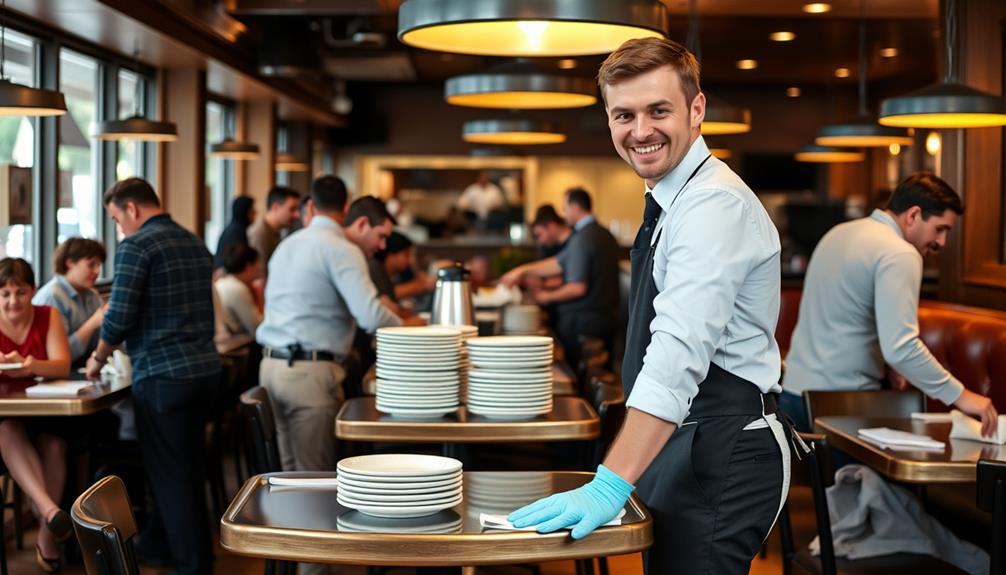
Applying for a busser position can be straightforward and rewarding. To navigate the application process effectively, follow these steps:
- Research the Restaurant: Before applying, explore the restaurant's social media pages to understand its atmosphere and values. This knowledge can help you tailor your application.
- Check Job Postings: Look for job postings on various platforms, including Monster. These postings often contain clear calls to action, encouraging you to submit applications promptly.
- Choose Your Application Method: You can apply in person or use the online application link provided in the job postings. Decide which method suits you best based on your schedule and comfort.
- Submit Your Application: Once you've prepared your resume and cover letter, submit your application. Make sure to highlight any relevant experience that aligns with the busser position.
Tips for Success as a Busser
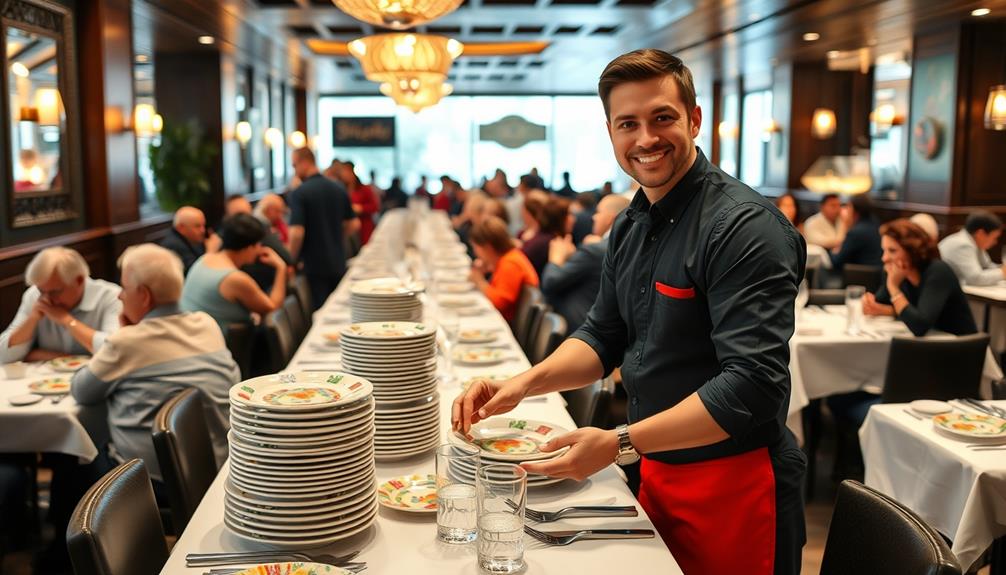
Once you've secured a position as a busser, focusing on your performance can set you apart in the fast-paced restaurant environment. Here are some tips to help you excel in your role:
| Tip | Description | Benefit |
|---|---|---|
| Communicate Effectively | Develop strong communication skills to collaborate with waitstaff and the kitchen. | Guarantees seamless service during busy shifts. |
| Attention to Detail | Cultivate a keen attention to detail to address customer needs promptly. | Enhances the positive dining experience. |
| Maintain Stamina | Stay active throughout your shifts to maintain physical stamina. | Helps you handle the demands of the job. |
| Positivity Matters | Embrace a positive attitude and customer service mindset. | Leads to increased tips and job satisfaction. |
Frequently Asked Questions
What Are the Responsibilities of a Busser?
A busser's responsibilities include promptly clearing tables, setting up for new guests, refilling condiments, assisting waitstaff, and maintaining cleanliness. You'll guarantee a welcoming environment and enhance the overall dining experience for customers.
Do Bussers Get Tips?
So, you're thinking bussers don't get tips? Well, they often share in servers' tips, boosting their earnings. In busy spots, you might find them making quite a bit more than just their base wage!
Is It Hard to Be a Busser?
Being a busser can be tough. You'll need stamina to keep up with the fast pace, strong observational skills to anticipate needs, and attention to detail for cleanliness. It's challenging, but rewarding with growth opportunities.
How Do Bussers Make Money?
Like hidden gems in a bustling market, you'll find bussers make money primarily through hourly wages and tips. In upscale spots, your earnings can soar, especially with tip-sharing from satisfied servers and customers alike.
Conclusion
In summary, being a busser is an essential role in the restaurant world, much like a knight tending to their castle. You keep things running smoothly, ensuring customers have a great experience. With the right skills and dedication, you can pave the way for career growth in the hospitality industry. So, grab your apron and get ready to hustle—it's a rewarding gig that can lead to exciting opportunities down the line!
